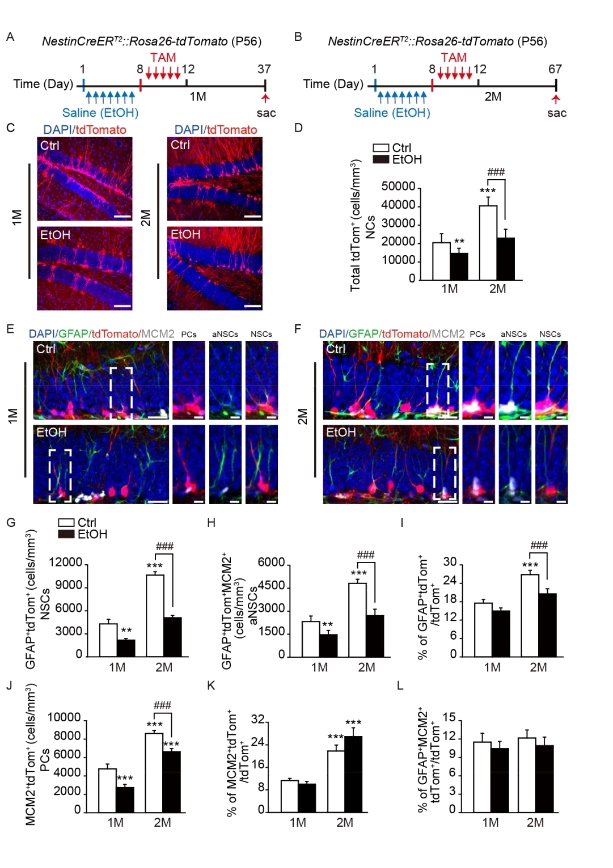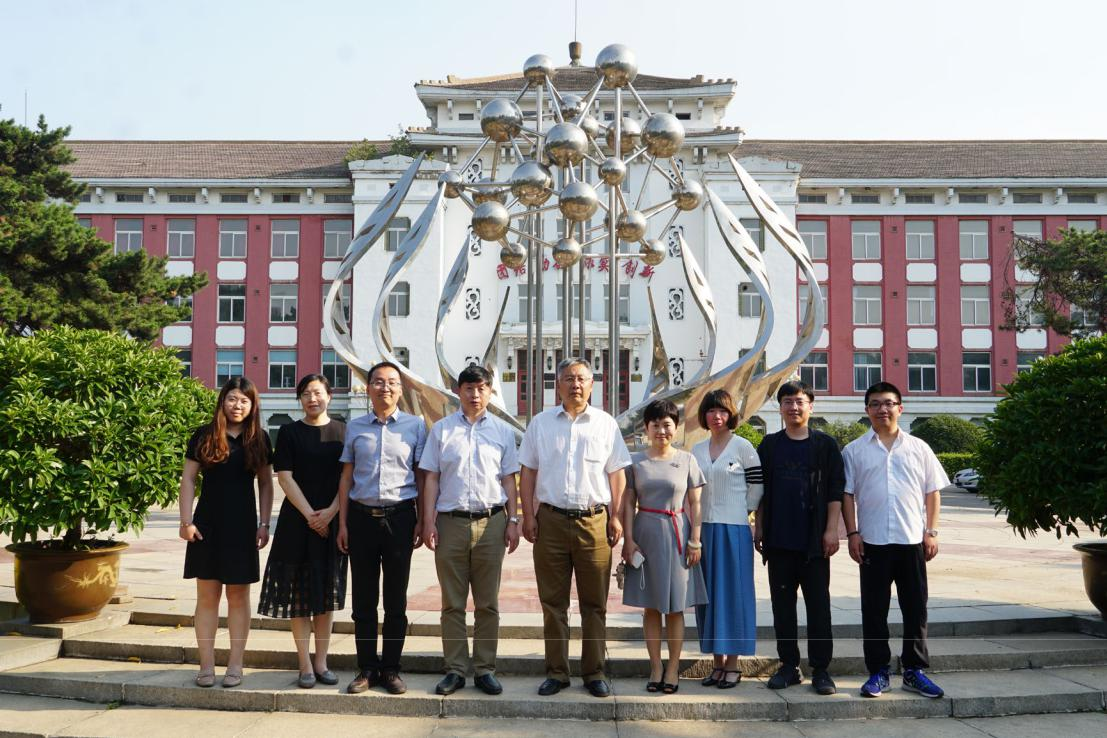NRR:沈阳药科大学杨静玉及李玉婷团队发现运动能改善酗酒对神经发育的影响
撰文:王桂香,王文佳,张烨,缑晓颖,张晴晴,黄滟淼,张阔,章浩天,杨静玉,李玉婷
酗酒会导致与学习记忆密切相关的海马神经发生异常和青少年中枢神经系统功能的长期紊乱[1-3]。然而,酗酒对内源性海马神经干细胞的发育谱系和新生神经元的树突棘重塑的影响尚不清楚。有文献报道,自主跑步可通过促进神经干细胞的存活和分化,增强海马神经发生[4-6],但自主跑步是否可改善大剂量乙醇所致的异常的海马神经发生和树突棘发育成熟仍不明确。
来自中国沈阳药科大学杨静玉及李玉婷团队近期在《中国神经再生研究(英文版)》Neural Regeneration Research)上发表了题为“Ethanol changes Nestin-promoter induced neural stem cells to disturb newborn dendritic spine remodeling in the hippocampus of mice”的研究。该实验通过给予 NestinCreERT2::Rosa26-tdTomato 转基因小鼠大剂量乙醇,进而通过他莫昔芬诱导内源性 tdTomato(tdTom)荧光蛋白的表达。首次给予他莫昔芬1或2个月后观察乙醇对海马神经发育谱系进展和新生神经元树突棘的重塑的异常影响。最后通过自主跑步或抑制哺乳动物雷帕霉素靶蛋白(mammalian target of 雷帕霉素amycin, mTOR)-组蛋白甲基转移酶 Zeste 基因增强子同源物 2 (enhancer of zeste homolog 2, EZH2)信号通路逆转乙醇所致的上述异常影响。
为探究乙醇对成年小鼠海马神经干细胞的激活,杨静玉等给予成年小鼠大剂量乙醇。在他莫昔芬 干预1或2个月后发现,乙醇显著抑制了成年小鼠海马齿状回内神经干细胞、激活型神经干细胞和增殖细胞的数量,且2个月时上述抑制作用更加明显。同时,乙醇也显著降低了神经干细胞在tdTom+神经细胞中所占的比例。这提示乙醇能显著抑制成年小鼠海马神经干细胞的增殖和激活(图1)。

图1乙醇可抑制成年小鼠海马齿状回神经干细胞的增殖和激活(图源:Wang et al., Neural Regen Res, 2024)
接下来,杨静玉等考察了大量乙醇对小鼠海马齿状回中神经干细胞发育谱系进展及新生神经元的影响。结果显示,乙醇能显著增加齿状回中间神经祖细胞的数量,并减少神经母细胞的数量,同时抑制其增殖能力,且能显著抑制新生神经元的生成和成熟, 2个月后该作用更加明显。这些结果表明,乙醇会对海马神经干细胞的神经发育谱系进展造成阻滞,导致更多的新生神经元停留在未成熟阶段,最终抑制了新生神经元的成熟(图2)。

图2乙醇能阻碍成年小鼠海马齿状回新生神经元的成熟(图源:Wang et al., Neural Regen Res, 2024)
为进一步明确乙醇对海马齿状回中新生神经元重塑的影响,杨静玉等采用内源性示踪技术观察小鼠海马新生神经元的树突形态,并利用罗盘映射方法[7]确定神经干细胞及新生神经元的定向及迁移过程。结果可见,给予小鼠大量乙醇后,神经干细胞出现随机和无序的定位状态,且2个月时变化更为显著。在生理状态下,海马新生神经元随着其生长会逐渐向颗粒细胞层迁移进而形成成熟的神经元,而乙醇明显阻断新生神经元的迁移与成熟。Sholl分析还发现,乙醇可显著降低了新生神经元的树突长度及树突复杂度,降低新生神经元树突棘的密度,且明显减少新生神经元蘑菇型树突棘和分枝型树突棘(代表更成熟的棘)所占树突棘的比例。上述这些乙醇造成的异常现象2个月时会进一步加剧。表明乙醇会持续抑制新生神经元的成熟,阻碍其有效整合到海马神经环路中(图3)。

图3乙醇抑制海马齿状回区新生神经元的树突棘的形成和发育(图源:Wang et al., Neural Regen Res, 2024)
自主跑步可通过促进神经干细胞的增殖和分化,进而促进海马的神经发生[4-6]。为探究自主跑步能否逆转上述乙醇所致的异常的海马神经发生,在成年小鼠乙醇干预7d后进行了为期1个月的自主跑步。结果发现,自主跑步基本恢复了乙醇阻滞的海马齿状回中神经干细胞的神经发育谱系进展,尽管与对照组相比仍存在显著差异,但接近于未进行自主跑步的对照小鼠相。提示自主跑步可促进小鼠海马齿状回中神经干细胞的激活以及其向新生神经元的分化,且可在一定程度上逆转乙醇引起的海马神经发生异常(图4)。

图4自主跑步可缓解乙醇阻滞的海马齿状回神经干细胞的神经发育谱系进展(图源:Wang et al., Neural Regen Res, 2024)
接下来,为了探究 mTOR-EZH2 通路是否参与改善乙醇诱导的异常海马神经发生,杨静玉等给予成年小鼠mTOR 抑制剂雷帕霉素并对新生神经元的树突成熟度进行分析。结果发现,乙醇可显著增加海马齿状回中pS6 阳性细胞的数量,降低海马齿状回颗粒下区H3K27me3的表达;而雷帕霉素则可逆转乙醇的作用。进一步树突成熟度分析发现,雷帕霉素可显著促进乙醇小鼠海马新生神经元的树突棘数量,提高相对较成熟的蘑菇型树突棘和分枝型树突棘占新生神经元树突棘的比例,但与雷帕霉素单独处理组仍存在显著差异。表明雷帕霉素可抑制乙醇诱导的mTOR通路过度激活,并部分改善乙醇引起的新生神经元树突棘发育不成熟的现象(图5)。

图5雷帕霉素可通过抑制mTOR-EZH2通路部分改善乙醇抑制的新生神经元的树突成熟度(图源:Wang et al., Neural Regen Res, 2024)
总之,该研究首次发现给予大剂量乙醇后,成年小鼠神经干细胞的定向发生明显异常,进而造成海马神经发生的持续紊乱,导致海马齿状回神经干细胞神经发育谱系进展受到阻滞,从而抑制新生神经元的成熟及新生树突棘的重塑过程。而自主跑步或者抑制mTOR-EZH2 通路可部分改善乙醇所导致的上述异常。该研究只是初步探索了mTOR-EZH2通路在乙醇抑制的海马神经发生谱系进展和新生神经元树突棘重塑中的作用,且乙醇影响海马神经干细胞的增殖、分化和神经发生的其他机制,如神经炎症、表观遗传学和神经免疫等尚未研究。
原文链接:https://doi.org/10.4103/1673-5374.379051
参考文献
[1] Squeglia LM, Jacobus J, Tapert SF. The effect of alcohol use on human adolescent brain structures and systems. Handb Clin Neurol. 2014;125:501-510.
[2] Campbell JC, Stipcevic T, Flores RE, et al. Alcohol exposure inhibits adult neural stem cell proliferation. Exp Brain Res. 2014;232(9):2775-2784.
[3] Chang GQ, Karatayev O, Liang SC, et al. Prenatal ethanol exposure stimulates neurogenesis in hypothalamic and limbic peptide systems: possible mechanism for offspring ethanol overconsumption. Neuroscience. 2012;222:417-428.
[4] Vetreno RP, Bohnsack JP, Kusumo H, et al. Neuroimmune and epigenetic involvement in adolescent binge ethanol-induced loss of basal forebrain cholinergic neurons: Restoration with voluntary exercise. Addict Biol. 2020;25(2):e12731.
[5] Vetreno RP, Crews FT. Adolescent binge ethanol-induced loss of basal forebrain cholinergic neurons and neuroimmune activation are prevented by exercise and indomethacin. PLoS One. 2018;13(10):e0204500.
[6] Vetreno RP, Lawrimore CJ, Rowsey PJ, et al. Persistent adult neuroimmune activation and loss of hippocampal neurogenesis following adolescent ethanol exposure: blockade by exercise and the anti-inflammatory drug indomethacin. Front Neurosci. 2018;12:200.
[7] Naylor AS, Bull C, Nilsson MK, et al. Voluntary running rescues adult hippocampal neurogenesis after irradiation of the young mouse brain. Proc Natl Acad Sci U S A. 2008;105(38):14632-14637.

沈阳药科大学杨静玉及李玉婷团队





